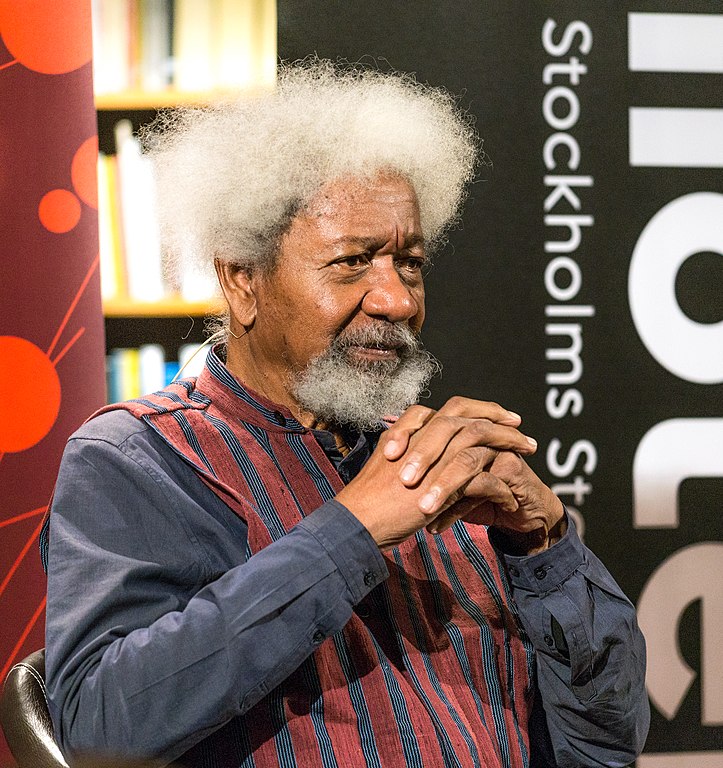1986 Nobel Prize winner in Literature Wole Soyinka during a lecture at Stockholm Public Library on October 4, 2018.
© Frankie Fouganthin licensed under the Creative Commons Attribution-Share Alike 4.0 International license.
Biography
Wole Soyinka was born on 13 July 1934 in Nigeria. He studied at University College Ibadan and the University of Leeds in the UK, graduating in 1957 before working for the Royal Court Theatre in London. A year later he wrote The Lion and the Jewel.
In 1960 he was awarded a Rockefeller Research Fellowship and returned to Nigeria where he established an amateur acting company, the “Nineteen-Sixty Masks”. Wole Soyinka continued to write essays about current affairs and Nigerian politics and his novel The Interpreter was published in 1964.
The following year Soyinka was arrested after taking over a radio station at gunpoint and broadcasting a message denouncing electoral fraud in Western Nigeria. His detention sparked international protests, and the next year he was acquitted on a technicality.
In 1966 there were two military coups and Nigeria appeared to be heading for a civil war after Colonel Odumegwu Ojukwu declared south-east Nigeria to be the independent Republic of Biafra. The following year Soyinka attempted to negotiate between the federal government and the Biafra separatists. This resulted in his arrest, accused of siding with the rebels.
In 1969 the civil war ended and Soyinka was released under an amnesty which followed. His experiences as a prisoner were chronicled in his book The Man Died: Prison Notes. After his release, he left Nigeria for six years before returning and then in 1983 went into exile again. The following year, The Man Died: Prison Notes was banned in Nigeria.
In 1986 Soyinka was awarded the Nobel Prize for Literature; the first African writer to win the prize. He returned to Nigeria once again and continued to write plays and essays; however, in 1994 yet again he was forced to flee Nigeria and go into exile. In 1997 he was charged in absentia with treason by the regime of General Sani Abacha. These charges were lifted following Abacha’s death in 1998.
Soyinka continues to live and work in both Nigeria and the USA.
Writing Sample
The little hole in the door is a peep-hole on the living. It sneaks into the yard of Purgatory, the house of lunatics, lifers, violent and violated nerves, cripples, tuberculars, victims of power sadism all safely hidden from questions. The guards thrust their fists through the hole and manipulate the bolt from either side. And I, on my stroll through the yard, casually, oh so casually, steal a quick look at the rare flash of a hand, a face, a gesture in that Purgatory. Alas, too often, all I see is a mere blur of khaki, the square planted rear of the guard on the other side.
Until this morning lying in bed I hear the noise of hammering. All morning the assault of blows is multiplied and magnified by the unique echoing powers of the crypt. (When it thunders my skull is the anvil of gods.) I step out to investigate and I find a squad of warders at the gate hacking and sawing and nailing until by noon, the breach is sealed. Only the sky is now open, a sky the size of a napkin trapped by tall spikes and broken bottles, but a sky. Vultures perch on a roof just visible from another yard. And crows. Egrets overfly the crypt and bats swarm at sunset: albino bats, sickly pale, emitting radio pips to prowl the echo chamber. But the world is dead, suddenly. For an eternity after ceasing the hammers sustain their vehemence. Even the sky retracts, dead.
Buried alive? No. Only something men read of.
Days pass, weeks, months. Buoys and landmarks vanish. Slowly, remorselessly, reality dissolves and certitude betrays the mind.
I am alone with sounds. They acquire a fourth dimension in a living crypt, a clarity which, as in the case of thunder, becomes physically unbearable. Pips from the albino bats pock the babble of evensong – Moslem and Christian, pagan and unclassifiable. My crypt they turn into a cauldron, an inverted ball of faiths whose sonorities are gathered, stirred, skimmed, sieved in the warp and weft of sooty mildew on walls, of green velvet fungus woven by the rain’s cunning fingers.
Buried alive? I must struggle through the trapdoor of my mind. I must breathe, deeply.
From ‘The King Of Solitude’ in This Prison Where I Live, ed. Siobhan Dowd (London, Cassell, 1996). ISBN: 0-304-33306-9
Useful links
Wikipedia page on Wole Soyinka: http://en.wikipedia.org/wiki/Wole_Soyinka
http://nobelprize.org/nobel_prizes/literature/laureates/1986/soyinka-bio.html
Noble Prize web site biography of Wole Soyinka: http://www.wolesoyinka.blogspot.com/
Comment by Wole Soyinka on a BBC item commemorating the anniversary of the BBC World Service, 2008: http://news.bbc.co.uk/1/hi/in_depth/7127423.stm
Wole Soyinka, PEN America Freedom to Write Lecture 2011: https://www.c-span.org/video/?300689-1/2011-pen-freedom-write-lecture
